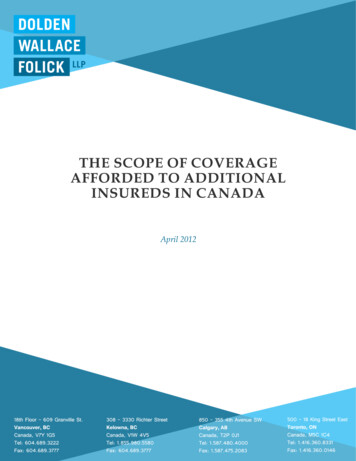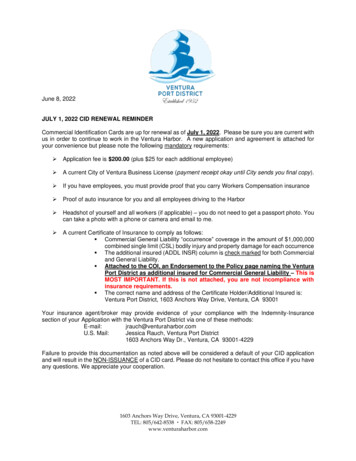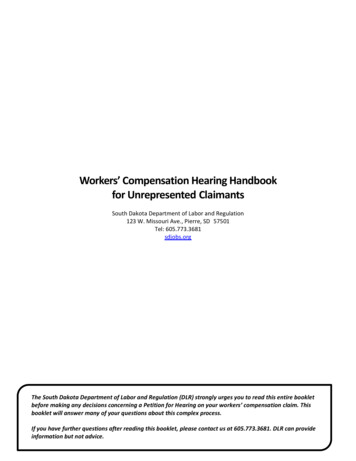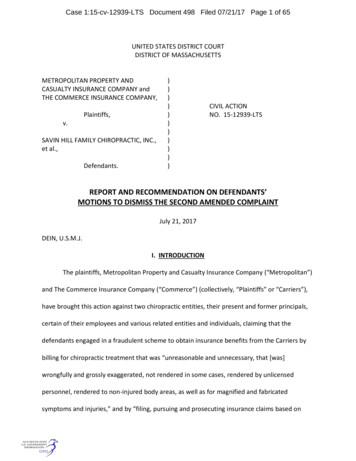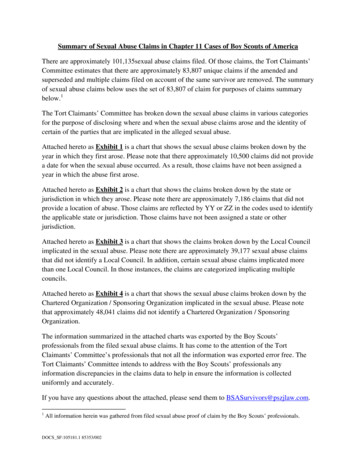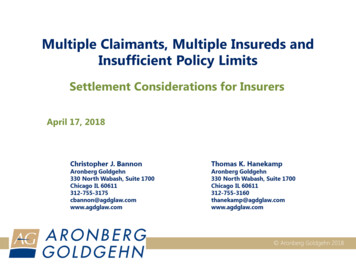
Transcription
Multiple Claimants, Multiple Insureds andInsufficient Policy LimitsSettlement Considerations for InsurersApril 17, 2018 Aronberg Goldgehn 2018
Discussion Topics Multiple Claimants andInsufficient Policy Limits Multiple Insureds and Inability to ObtainReleases for All Through Settlement One Insured’s Consent to SettlementImpacting Settlement for Otherswww.agdglaw.com2
Multiple Claims & Insufficient LimitsUnder E&O Policies Medical Professionals Lawyers Other Professionalswww.agdglaw.com3
Typical Scenarios Giving Rise toMulti-Claim Dilemma Numerous suits or claims made within oneclaims-made policy periodMultiple claimants within a single suitDefense of several suits (or certainsignificant suits) begins depleting limitsSettlement demands of one or moreclaimants (but not all) would exhaust limitswww.agdglaw.com4
Multi-Claim Settlement DilemmaPossible post-exhaustion claims against theinsurer by: Remaining claimant(s)– Extra contractualInsured(s)––Breach of contract (continuing duties todefend/indemnify)Extra contractualwww.agdglaw.com5
Policy Language reSettlement and DefenseB. Defense and SettlementThe Company will have the right and duty to defend any Claim against an Insuredseeking Damages to which this policy applies, even if any of the allegations of theClaim are groundless, false or fraudulent. The Company's right and duty to defendany Claim shall end when the Company's Limit of Liability has been exhausted bypayment of Damages and/or Claim Expenses, or has been tendered to theInsured or to a court of competent jurisdiction.The Company shall not settle any Claim without the Insured's written consent. If,however, the Insured refuses to consent to any settlement recommended by theCompany and elects to contest the Claim, or continue any legal proceedings inconnection with such Claim, then the Company's maximum liability shall belimited to the amount for which the Claim could have settled, including the totalamount of Claims Expenses incurred up to the date of the Insured's refusal. Suchamounts are subject to the provisions of section C. Policy Limits.www.agdglaw.com6
Judicial Approaches1.Deference to Insurer in attempting to settle fewer than allclaims.Miller v. Georgia Interlocal Risk Management Agency, 501 S. E. 2d589 (Ga. App. 1998)2.Permissible for insurer to settle one claim and leave anotherpotentially excess claim open.State Farm v. Murphy, 348 N. E. 2d 491 (Ill App 1976)www.agdglaw.com7
Florida ApproachInsurer Has 3 Obligations:1.Fully investigate all the claims to determine how to bestlimit the insured’s liability2.Seek to settle as many claims as possible within thelimits3.Avoid indiscriminately settling selected claims andleaving insured at risk of excess judgments that couldhave been minimized by wiser settlement practicesFarinas v. Florida Farm Bureau Gen. Ins. Co., 850 So. 2d 555(Fla. Dist. Ct. App. 2003)www.agdglaw.com8
“Let’s Be Reasonable”Texas Approach“ when faced with a settlement demand arising out ofmultiple claims and inadequate proceeds, an insurer mayenter into a reasonable settlement with one of the severalclaimants even though such settlement exhausts ordiminishes the proceeds available to satisfy other claims.Such an approach, we believe, promotes settlement oflawsuits and encourages claimants to make their claimspromptly.”Texas Farmers Ins. Co. v. Soriano, 881 S. W. 2d 312 (Tex.1994)www.agdglaw.com9
To Interplead or Not To Interplead Interpleader – statutory vehicle for stakeholder todeposit property with the courtTypical use in insurance context – life insurance policy(fixed amount) with competing claimantsInterpleader in third-party liability context?www.agdglaw.com10
Interpleader –the StatuteFRCP 22. Interpleader(a) GROUNDS.(1) By a Plaintiff. Persons with claims that may expose aplaintiff to double or multiple liability may be joined asdefendants and required to interplead. Joinder forinterpleader is proper even though:(A) the claims of the several claimants, or the titles on which theirclaims depend, lack a common origin or are adverse andindependent rather than identical; or(B) the plaintiff denies liability in whole or in part to any or all ofthe claimants.www.agdglaw.com11
Interpleader Recognized as Proper inMultiple Claim Situation “Interpleader actions, while not recognized in situations suchas this, are to be encouraged as part of the duty of good faithof the insurer.” Boris v. Flaherty, 672 N.Y.S.2d 177 (N.Y. Sup. Ct.1998)One of the three alternative courses of action an insurer cantake when faced with competing claims in excess of limits.Club Exchange Corp. v. Searing, 567 P.2d 1353 (Kan. 1977).Use of interpleader in multiple claim situation can provide“ a judicially supervised forum for the collective resolution ofall competing claims, the very purpose of the interpleader.”Lehto v. Allstate Ins. Co., 31 Cal. App. 4th 60 (1994)www.agdglaw.com12
Concerns With Interpleading LiabilityPolicy ProceedsDefense Obligation Continues During Interpleader Exhaustion must be per policy terms – “payment ofjudgments or settlements”Interpleader could be “artificial exhaustion” notcontemplated by policy provisionsDefense within limits policies – interpleader createspossibility of payment for defense beyond limits–Is stay of multiple suits possible during interpleader?www.agdglaw.com13
Concerns With Interpleading LiabilityPolicy Proceeds Potentially inconsistent with duty to remove asmuch exposure as possible from insuredOnce policy proceeds are interpleaded, insurer (andinsured) loses control over themQuestionable whether large exposure cases wouldbe settled before trialwww.agdglaw.com14
Practical Pointers - Multiple ClaimsMajority Approach – Most Jurisdictions1.Keep insured well informed about the case and settlement opportunities2.Gather all available information necessary to make informed decision3.Seek a global settlementa.Individual negotiations, orb.Tell claimants that limits are available if claimants can agree on division4.Offer insured control of available limits to settle cases it believes are mostappropriate to settle, or solicit insured’s input on which claims to settle5.Consider whether interpleader advisable6.If “global” not possible – use “reasonable” approach to individualsettlements7.Document all activity and communicationswww.agdglaw.com15
Multiple Claimants –California Rule Insurer that settles on anything less than global basisrisks liability for extra-contractual claim“A carrier, faced with multiple claims, must, with dueregard for the interests of its insured, attend to [theinsured’s] best protection against all of these.” Kinder v.Pioneer Ins. Co., 231 Cal. App. 2d 894 (1965)www.agdglaw.com16
Practical Pointers - Multiple Claims(California)1.2.3.4.5.Keep insured well informed about the case and settlementopportunitiesGather all available information necessary to make informed decisionSeek a global settlementa.Individual negotiations, orb.Tell claimants that limits are available if claimants can agree on divisionOffer insured control of available limits to settle cases it believes aremost appropriate to settle, or solicit insured’s input on which claimsto settleMake sure claimants know the policy limits and that insurer can’tsettle piecemealwww.agdglaw.com17
Settling Claims AgainstLess Than All InsuredsMajority ApproachInsurer is permitted to tender limits on behalf ofonly one insured, if not possible to settle on behalfof all.–Florida, Illinois, Louisiana, Massachusetts,Missouri, Ohio, Pennsylvania, Texaswww.agdglaw.com18
Majority Approach “It is an insurer’s unreasonable failure to pursuea settlement offer, rather than its acceptance ofone, which will expose it to liability for bad faith.” Exhaustion of limits through payment for oneinsured terminates insurer’s duty to defend otherinsureds.– Country Mutual Insurance Co. v. Anderson, 257 Ill. App.3d 73 (1993).www.agdglaw.com19
Impact of Set-Off ConsiderationsAvailability of set-off for remaining insured may beimportant factor Remaining insured’s right to setoff supports propriety ofsettlement for other insured.– Millers Mut. Ins. Co. Ass’n of Illinois v. Shell Oil Co., 959 S.W.2d 864 (Mo. Ct. App. 1998) Absence of set-off for remaining insured warrants findingsettling insurer has continuing duty to defend– Shell Oil Co. v. Nat’l Union Fire Ins. Co. of Pittsburgh, 44Cal.App.4th 1633 (1996)www.agdglaw.com20
Practical Pointers in Majority View States1.Attempt to settle for a release of all insureds2.Notify all insureds of claimant’s refusal to release allinsureds3.Confirm that claimant’s counsel knows that coverage isprovided to multiple insureds4.If repeated attempts to settle for all insureds areunsuccessful, attempt to reasonably settle (up to policylimits) on behalf of less than all insureds5.Document all settlement efforts in writing!www.agdglaw.com21
Settling Claims AgainstLess Than All InsuredsMinority ApproachInsurer cannot tender policy limits unless allinsureds are released–Alaska, California, New Yorkwww.agdglaw.com22
Minority Approach “It is absolutely no answer for the company to say that itpaid the full amount of its policy if in so doing it fullyprotected one of its insureds and left the othercompletely exposed.”– Smoral v. Hanover Ins. Co., 37 A.D. 2d 23 (N.Y. App.Div. 1971) Failure to consider the interests of every insured duringthe process of settling indicates lack of good faith.– Palmer v. Financial Indem. Co., 215 Cal. App. 2d 419(1963).www.agdglaw.com23
Practical Pointers in Minority View States1.Attempt to settle for a release of all insureds2.Notify all insureds of claimant’s refusal to release allinsureds3.Confirm that claimant’s counsel knows that coverage isprovided to multiple insureds4.If repeated attempts to settle for all insureds isunsuccessful, advise insureds and claimant’s counselthat claim cannot be settled under the circumstances5.Document all settlement efforts in writing!www.agdglaw.com24
Multiple Insureds andSettlement Consent Insurer’s right to settle contingent on“Insured’s” consent to settlement Reasonableness requirement for withholdingconsent? Can one insured’s refusal toconsent prevent a settlementinvolving multiple insureds?www.agdglaw.com25
Consent LanguageThe Company shall not settle any Claim without theInsured’s written consent. If, however, the Insured refuses toconsent to any settlement recommended by the Companyand elects to contest the Claim, or continue any legalproceedings in connection with such Claim, then theCompany’s maximum liability shall be limited to theamount for which the Claim could have settled, includingthe total amount of Claims Expenses incurred up to thedate of the Insured’s refusal. Such amounts are subject tothe provisions of section C. Policy Limits.www.agdglaw.com26
Settlement WithoutUnanimous Consent PL Policy allowed insurer to settle “with the written consent ofthe Insured.” Hospital (named Insured) consents to settle medicalmalpractice suit Individual doctor won’t consent Insurer settles and doctor sues insurer Holding Insurer not required to seek doctor’s consent Rationale Giving each individual doctor (and others) rightto refuse consent “would virtually paralyze [the insurer] in itsefforts to fulfill its contractual duty to defend.”– Jayakar v. North Detroit General Hospital, 451 N.W. 2d 518 (Mich.Ct. App. 1990).www.agdglaw.com27
Complete Consent Required Suit only against employee of Named Insured Employee’s defense counsel, with insurer’s authority, makessettlement offer, contingent on client consent Employee refuses consent, so employer also withholds consent Claimant attempts to enforce oral settlement agreement Holding Settlement not enforceable Rationale Employer’s consent was not sufficient where policyrequires “the INSURED’s consent”– Had the intent of the policy been to allow settlement based onNamed Insured’s consent, policy would have said thatMosely v. Wilson, 1991 WL 134285 (E.D. Pa. 7/18/91)www.agdglaw.com28
Practical Considerations –Multiple Insureds &Consent Requirement1. Use of “hammer clause” warranted?2. Reasonable to settle for consenting insured(s)and continue litigating claim against nonconsenting insured?3. Is consenting insured the Named Insured?4. Is consenting insured a party to the case?www.agdglaw.com29
Questions?Christopher J. BannonMember, Aronberg Goldgehncbannon@agdglaw.comThomas K. HanekampMember, Aronberg Goldgehnthanekamp@agdglaw.com Aronberg Goldgehn 2018
one, which will expose it to liability for bad faith." Exhaustion of limits through payment for one insured terminates insurer's duty to defend other insureds. - Country Mutual Insurance Co . v. Anderson, 257 Ill. App. 3d 73 (1993). 19 www.agdglaw.com

